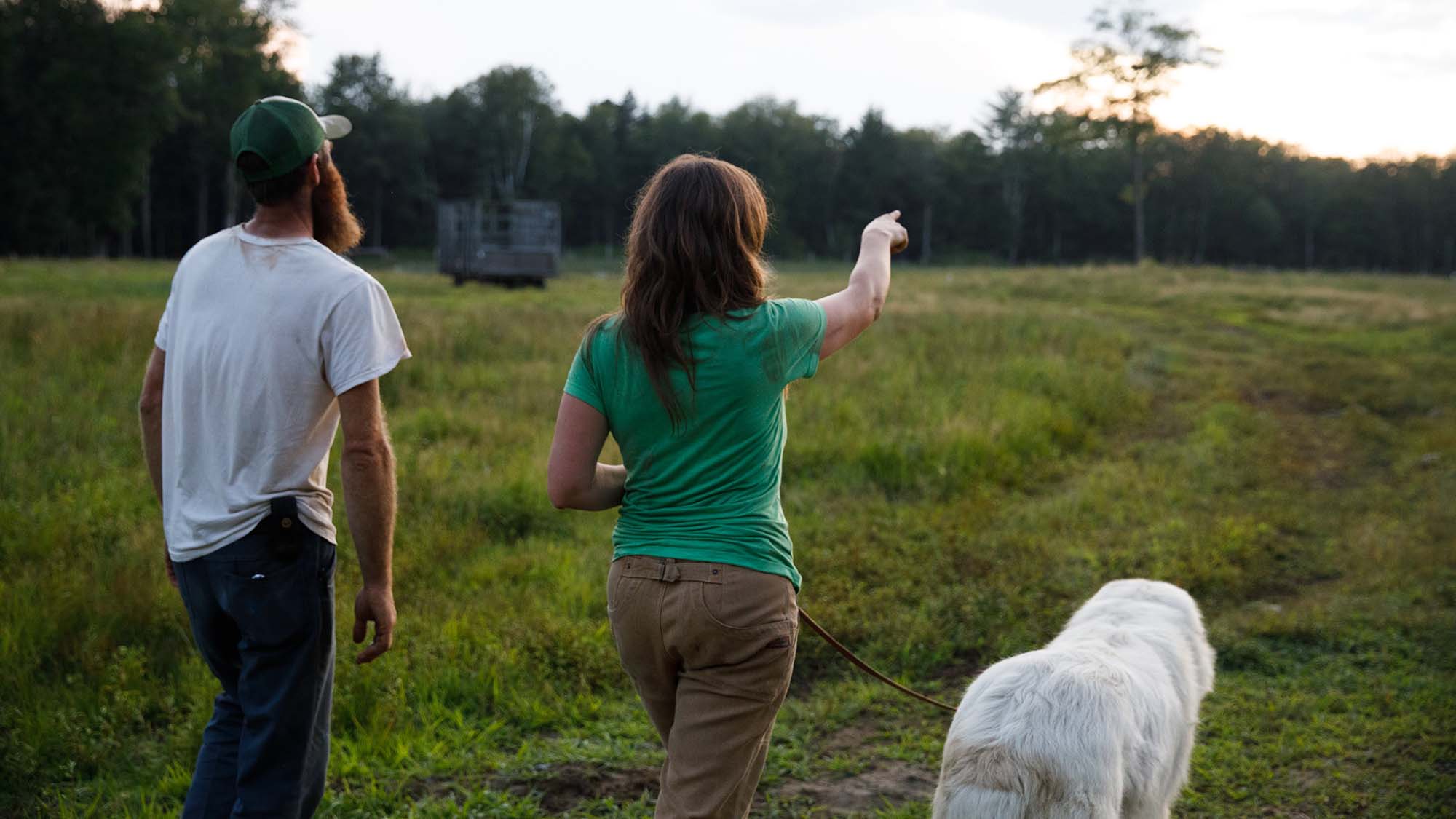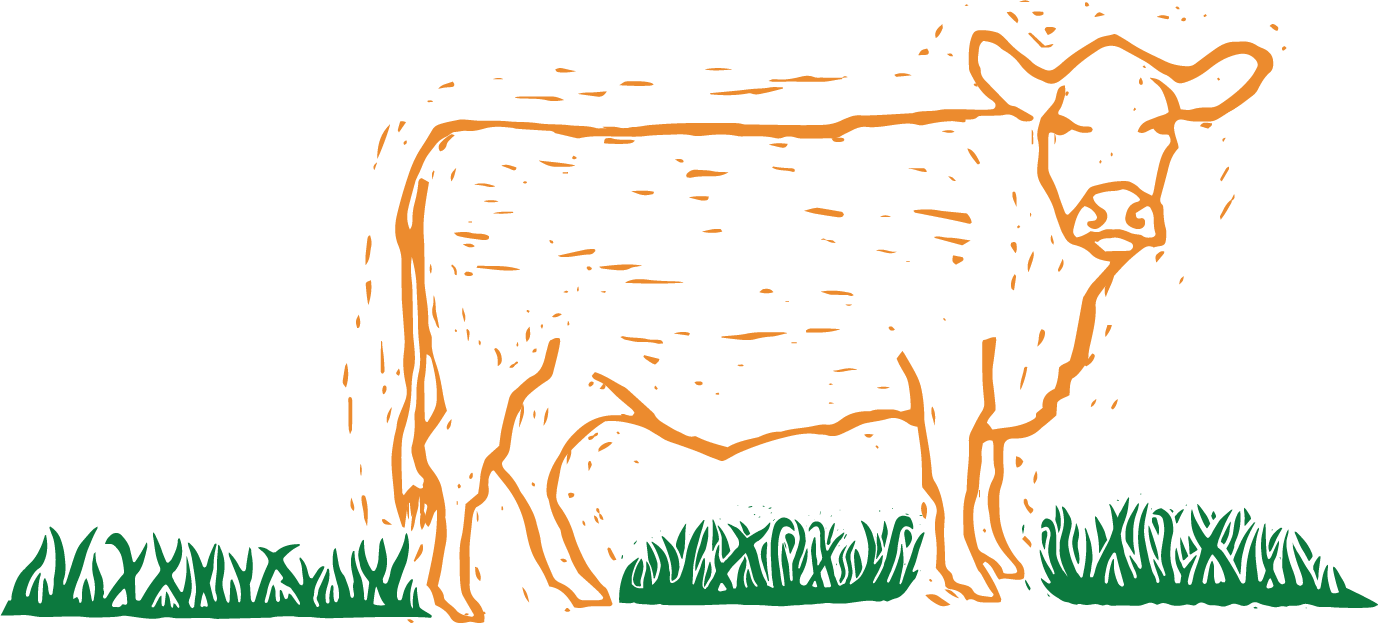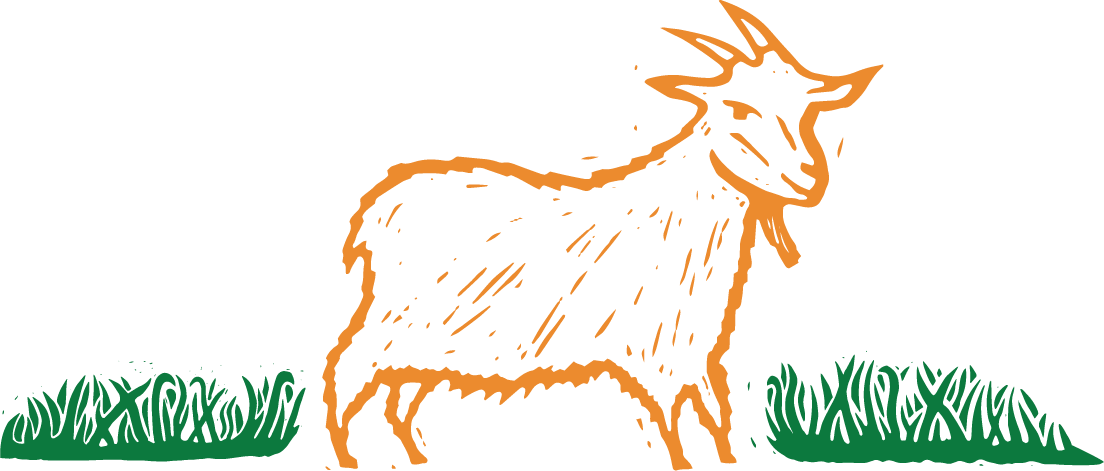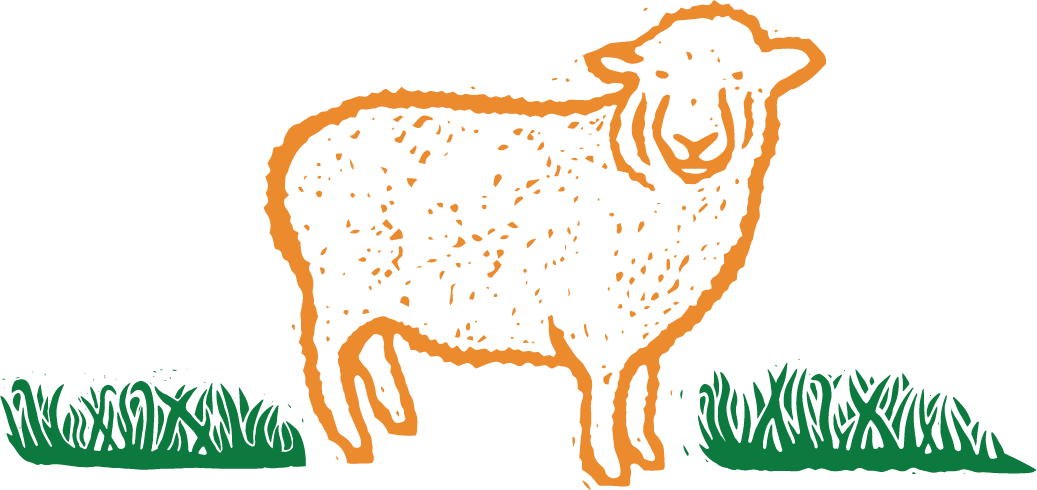Our Organic, Regenerative Farming Practices
We understand how it feels to search for food that is raised with care. That’s why we started raising our own! We raise our organic animals with the utmost care to ensure they produce the healthiest and most delicious organic meat you can buy.
Our animals have year-round outdoor access, eat organic feed, and are raised without the use of antibiotics and chemical wormers. Using regenerative farming techniques such as rotational grazing, these animals improve our farm soils while making use of the abundant grasses that grow on the farm.
Apple Creek Farm embraces the “nose-to-tail” ethos by making use of all parts of the animal, including those that are often thrown away. This helps reduce food waste and the carbon footprint of our farm.
Keep scrolling to read about how we raise our beef, chicken, eggs, goat, and lamb.
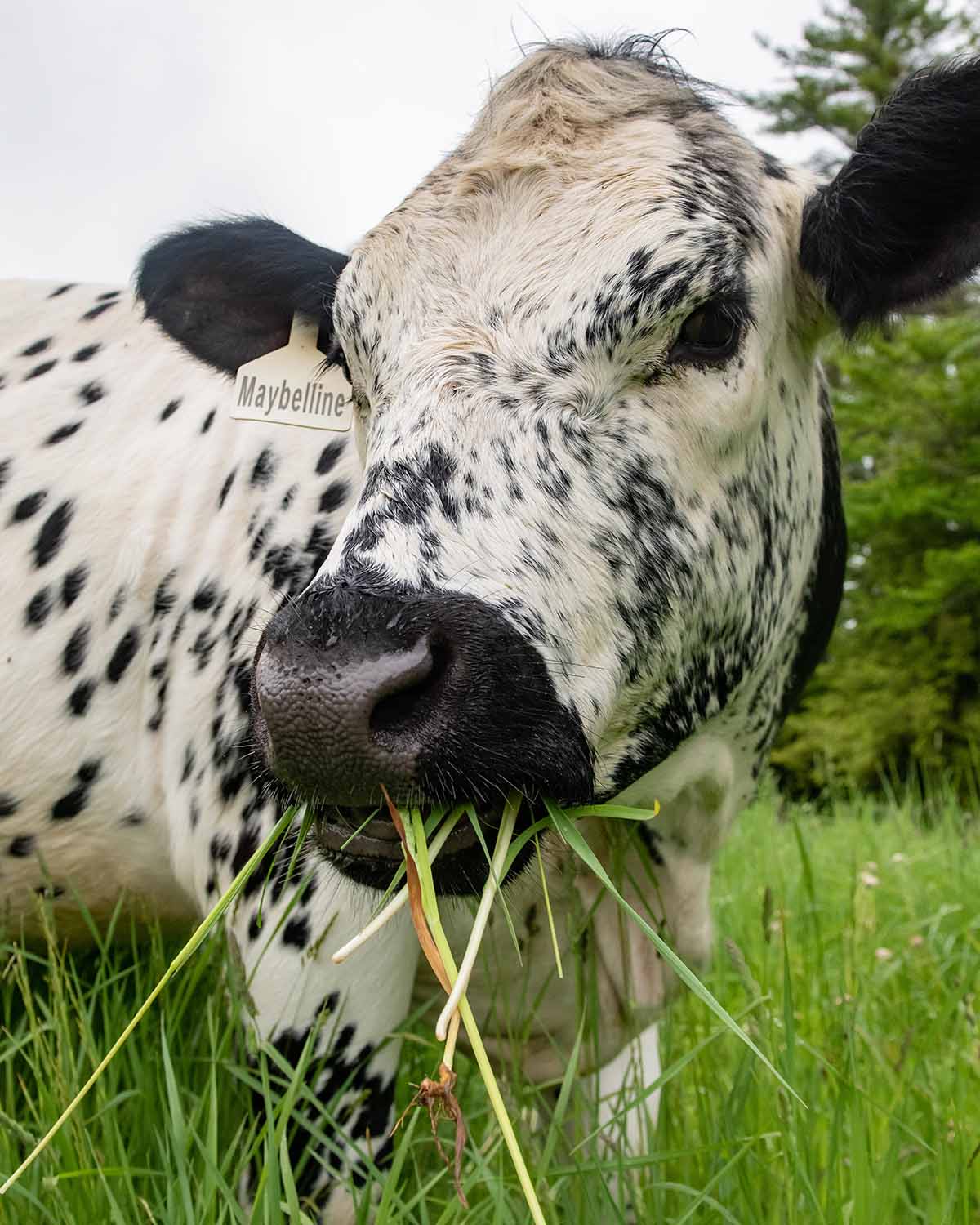
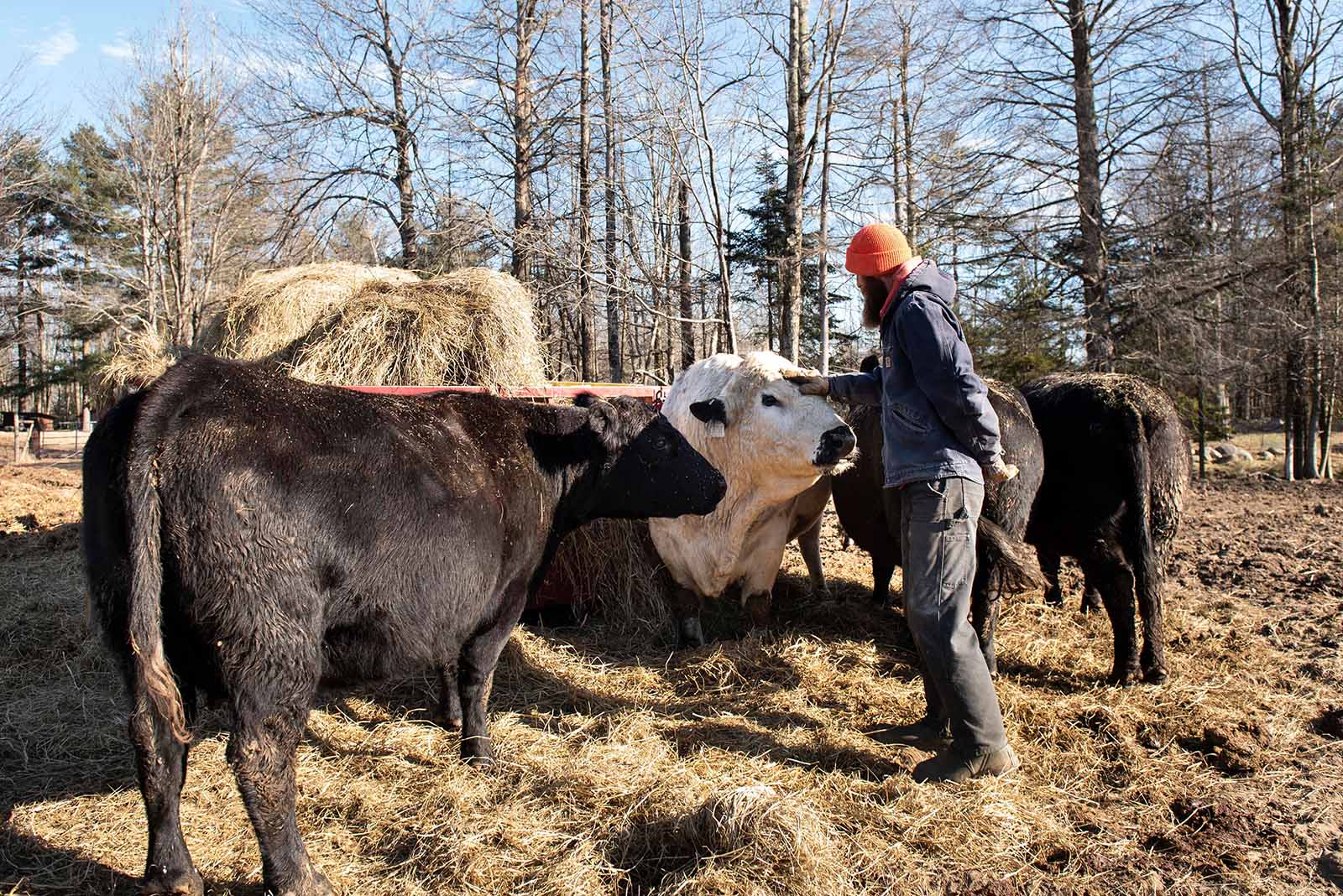
Organic Grass-Fed Beef
Our beef cows enjoy fresh, green organic pastures in the summer and are fed organic dry hay and baleage in the winter. We have a cow / calf operation meaning we keep a herd of breeding cows alongside their offspring. We calve in the Fall, wean in the Spring, and then move our calves to a leased field for “summer camp.” In the Fall, the weaned calves return to the farm to rejoin the herd, which now includes their siblings!
Our beef is 100% grass-fed and 100% grass-finished. We do not feed grain to our cows and instead, graze them over 2 growing seasons to finish between 24-28 months of age. The combination of grass finishing and age makes for unparalleled flavor and marbling.
We raise cows that include Angus, British White Park, and Hereford genetics. Our goal is to breed animals that do well on pasture and have a calm, even temperament. We have in the past kept a bull but have moved toward artificial insemination (AI) for our cows. This enables us to breed to the same bull if we desire, choose the sex of the offspring as we grow our herd, and select bulls with genetics such as “calving ease” which are beneficial to first-time heifers.
Collapsible content
Is all your beef certified organic?
Nope, we produce both grass-fed and organic beef. Some of our products use non-organic ingredients or meat from animals that were not certified organic. Our products are clearly labeled to indicate those that are certified organic.
Is your beef grass-fed?
Yes, this means that in the summer our cows are eating grass and are moved to fresh pasture daily.
Is your beef grass-finished?
Yes, our animals are on pasture their entire lives. It is our aim to finish our animals through rotational grazing through the summer before harvest in the Fall.
Can I buy a whole animal? How about a half or quarter cow?
Nope, currently we sell our beef by the cut. If you’d like some of the value of buying a whole animal without buying a new freezer, then try our CSA.
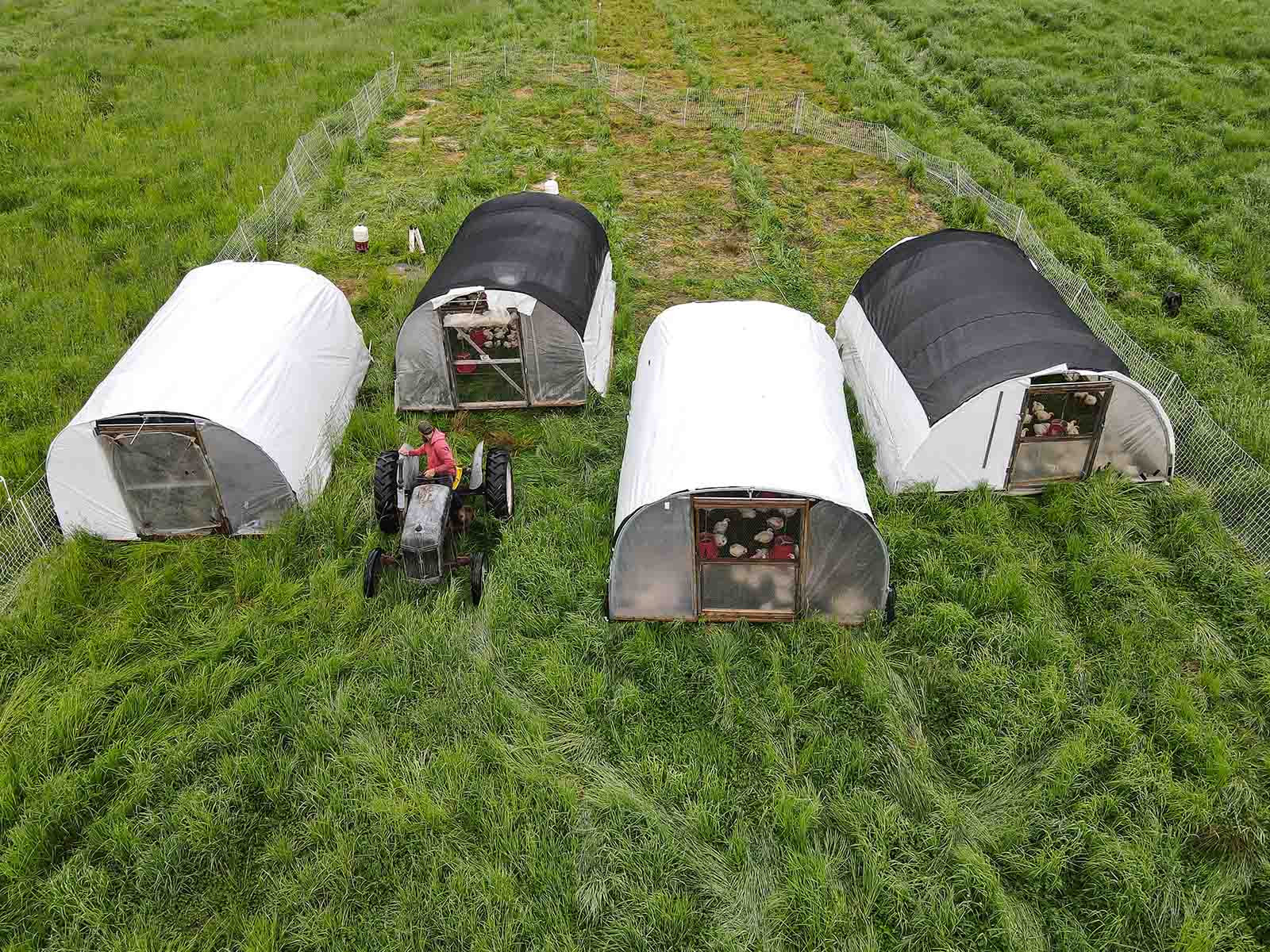
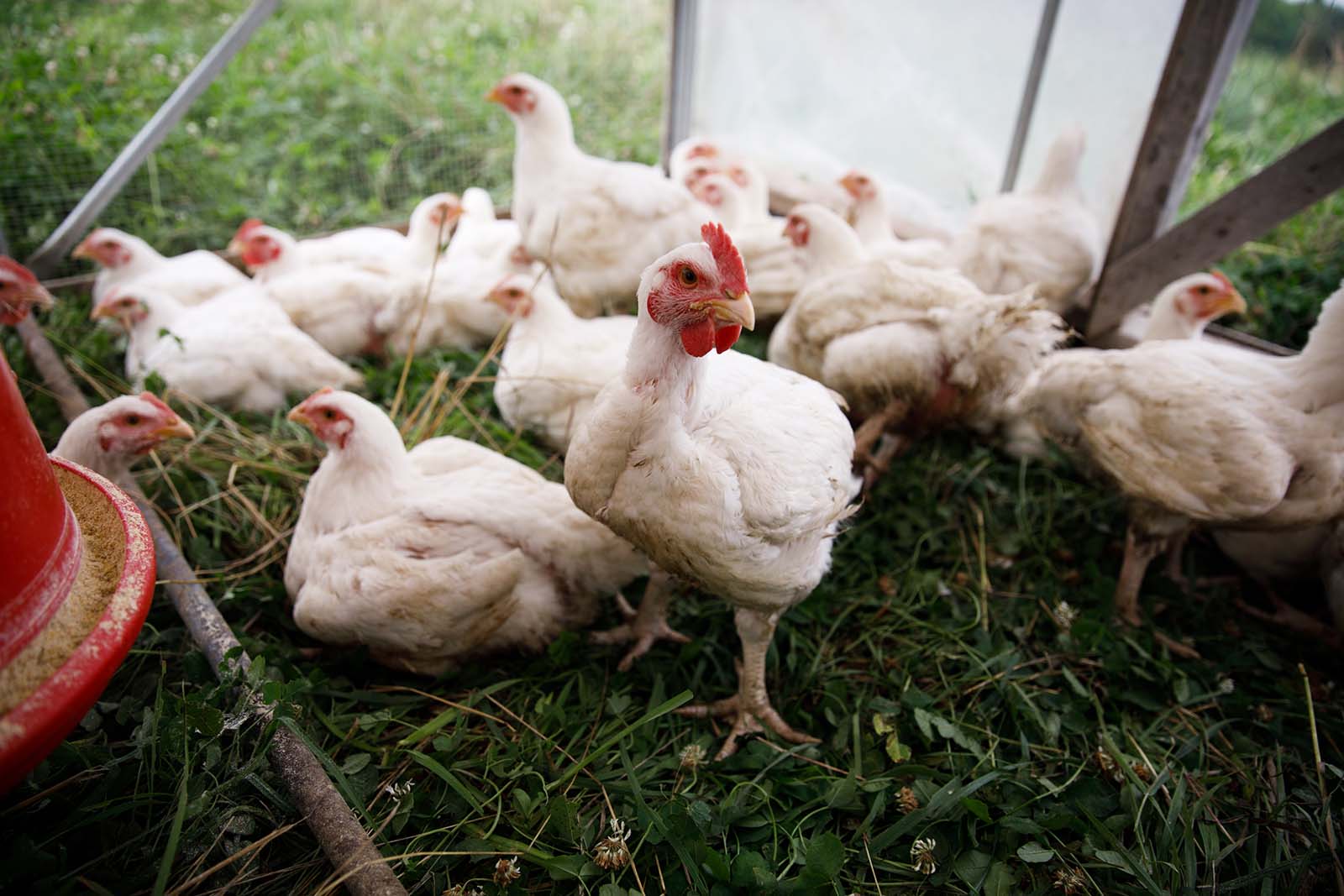
Pasture Raised Chicken
Apple Creek Farm produces certified organic chicken and eggs.
We raise Cornish cross broiler chickens for meat. Our farm season for chicken begins in late March with the arrival of our first batch of chicks. Each chick gets a drink of water and is warmed up by the hair dryer before heading out to the brooder. Our Ohio brooder, roughly the size of a twin bed, is equipped with 4 heat lamps. The brooder is designed so the chicks can run under it, or outside of it to regulate their own temperature. The brooder helps keep the chicks at an average of 90 degrees for the first week of life, until their feathers grow in. Depending on the weather, the chicks may leave the brooder at just two weeks old! We aim for all chicks to be out on pasture within 3 weeks so they can spend most of their time with the grass between their toes!
All of our farm’s chickens are raised on pasture in floorless hoop structures. These houses are flexible enough to offer warmth and shelter on cold, Spring days and shade and plenty of air flow on Summer days. These hoop structures are moved to fresh grass daily. This spreads the chickens’ manure across the fields all summer, which in turn fertilizes the pasture and ensures ample grass for the cows, goats, and sheep who follow. Unlike conventional poultry barns, the inside of our hoop houses smell like fresh cut grass, the birds are active and engaged and in the late summer as we move the houses, you can see them plucking grasshoppers out of the grass!
Cornish cross chickens are an economical and adaptable breed for pasture-raised poultry. They efficiently convert grain into meat and if properly raised, adapt well to pasture life. On our farm, chickens are fed a certified organic grain diet and supplement that with grass as well as any small insects and invertebrates they may catch on pasture. Cornish cross chickens have been bred to grow quickly and so are harvested at 7-8 weeks of age.
Our organic chicken is sold fresh on a weekly basis from May – September. Once weekly harvests end, frozen chicken is available while supplies last. Chicken is sold as whole birds, half birds, whole legs (thigh & drumstick), wings and breast. All our chicken is packed and sealed for storage either fresh or frozen.
Collapsible content
Can I find your chicken in the grocery store?
Nope, we only sell our chicken at farmers’ markets.
Do you feed soy or corn?
Yes, we do not see ill-effects from either of these ingredients and find that many people are actually allergic to the desiccants used in conventional grain harvest. Because our feed is certified organic, none of these chemicals are used. The alternative feeds we’ve investigated source organic peas from far-off places and have been demonstrated to reduce the productivity and growth rate of chickens.
When can I get fresh chicken?
We harvest chicken weekly from mid-May through the end of August. During that time you can find fresh chicken at our market stand on Fridays and Saturdays each week.
Can I order custom cuts?
Generally, we like to keep our cut list consistent each week. If you have a special event, you’re planning for, then please be in touch at least 14 days prior.
Can I get chicken feet?
It’s complicated! We can get chicken feet from our butcher, but they are uncleaned and unpeeled. Because of this, they are not legal for sale. We hope when our processor’s new poultry facility is finished that we’ll be able to offer chicken feet.
Can I get gizzards from you?
You can if you’re prepared to clean them yourself. This means our butcher will remove them and package them in sanitary conditions, but that you will need to open each gizzard and clean out the contents (rocks, grit, and grass) and then peel the tough fibrous interior lining. These delicious little packages are packed with good things and are best cooked low and slow or under pressure until tender.
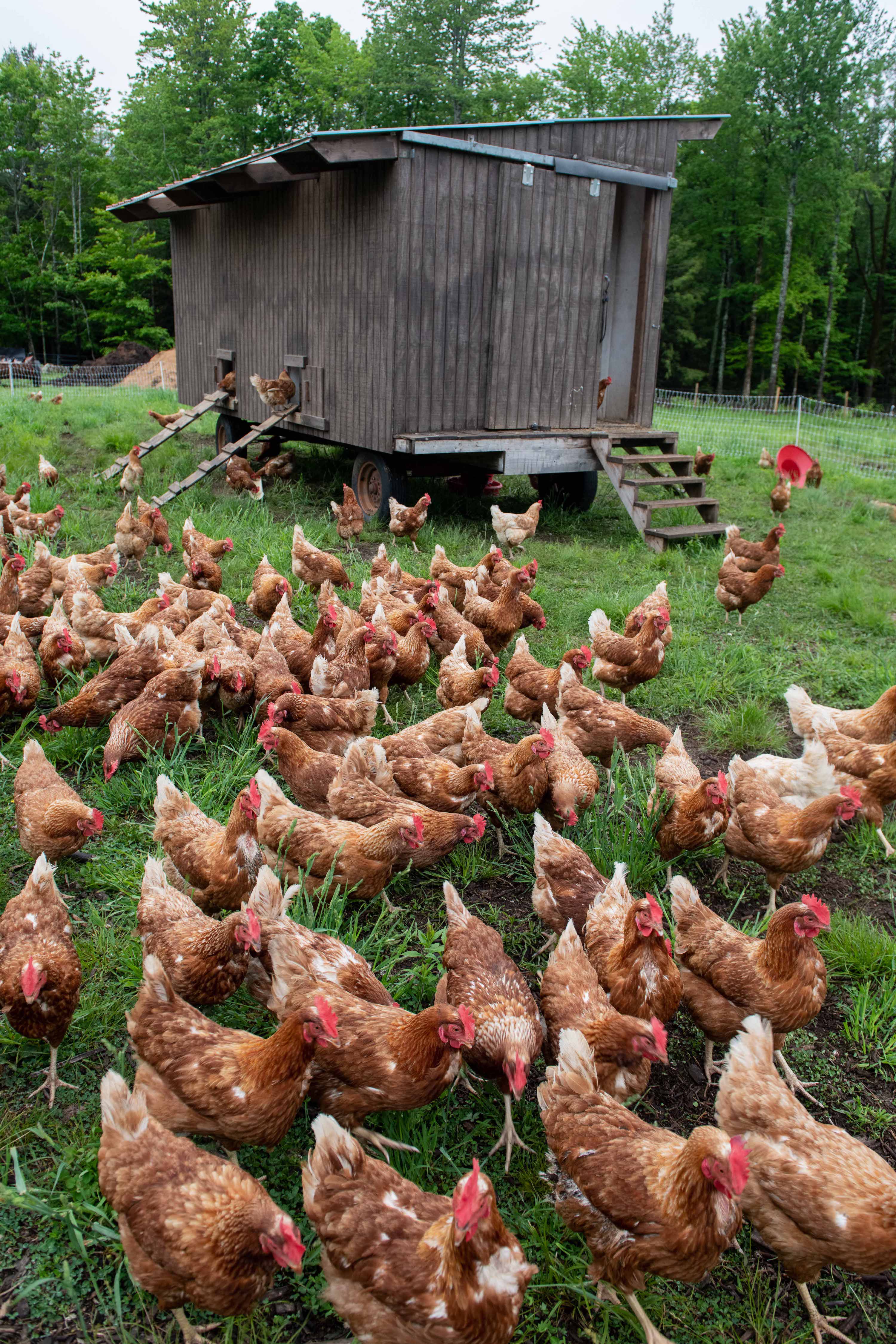
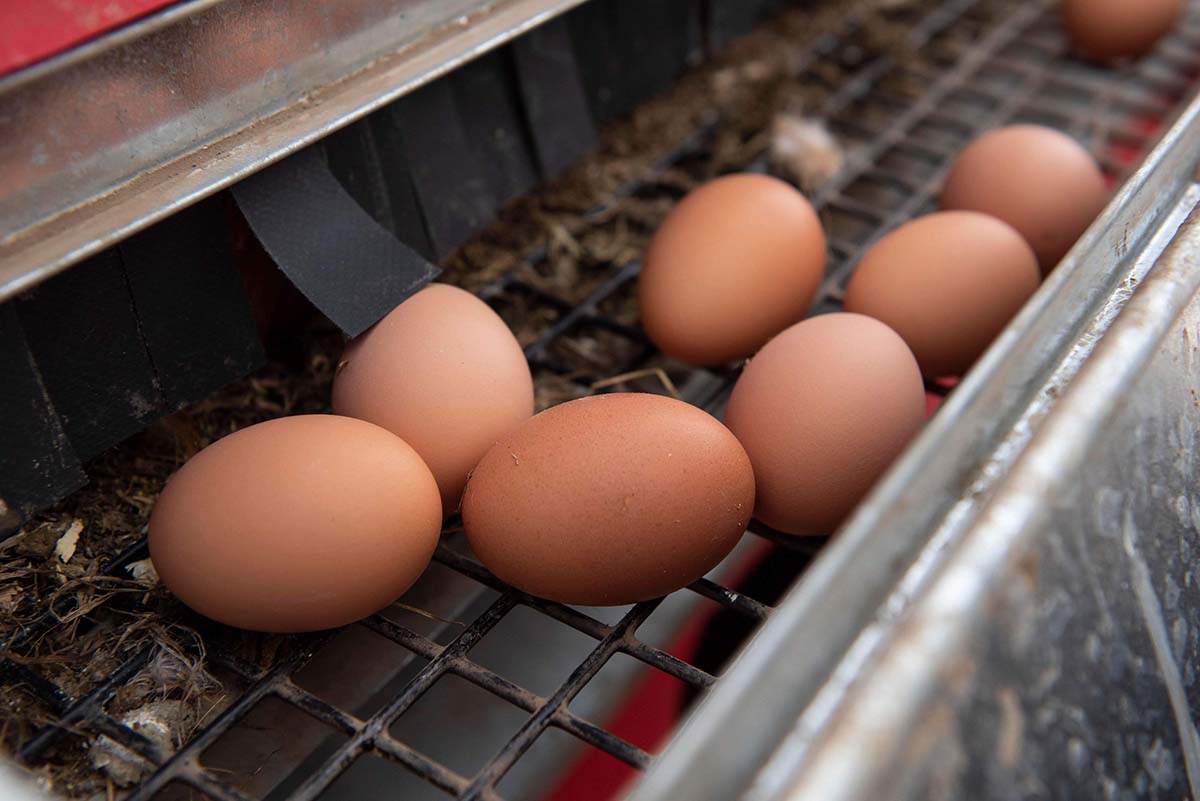
Organic Pasture Raised Eggs
Each Spring, our laying hens move out to their pasture houses. Then, we clean out their winter hoop house and fill it with fresh bedding. A few days later, our new class of hens called pullets arrive. The pullets have been raised on an organic farm in Pennsylvania and are 16 weeks old. For the next four weeks, we ensure these young ladies have a healthy diet and a low stress environment, so they gain a few pounds and are ready to begin laying eggs at 20 weeks.
Our laying hens are hybrid birds, most often a cross between leghorns and Rhode Island Reds. These birds are an F1 cross, which means they are the first generation of offspring from two different breeds. This gives them extra vigor and makes them ideal for the specific job of laying eggs. Unlike broiler chickens who grow thick, sturdy legs to support their wide, squat frames; laying hens are built like long-distance runners. Their narrow, wedge-shaped bodies are designed specifically to support their egg laying career.
In the hoop house they are introduced to nest boxes, learn to roost, and allowed to explore. Once they begin laying, we show the hens how to lay their eggs in our community nest boxes. These are constructed so many hens can be inside each one simultaneously. The nest boxes are designed with a sloping floor that ensures once the hen lays her egg it rolls safely out of her reach to a drawer which we can open and collect it. These nest boxes keep the eggs cleaner than traditional individual nest boxes, reduce the need for bedding, and reduce broodiness in the hens. We also like the nest boxes for their ease of use and efficiency. I can attest that reaching under a grumpy hen to get her eggs (and the others she sat on) is not something I miss!
Once the hens learn to consistently lay their eggs in the nest boxes (not on the floor, in the grass, or somewhere creative) they move outside and into their moveable hen houses. This is when their resident bodyguard, one of our two purebred Pyrenees dogs, moves in with them. The presence of the dog deters would-be assassins such as fox, hawks, owls, and opossums. When our hens are on pasture, they are moved every 5-7 days to ensure they don’t ruin the pasture and to keep those predators guessing. This ensures that any internal parasites are left behind, as is manure that fertilizes our pastures for the next group of animals.
Eggs are collected daily and refrigerated immediately to preserve freshness and egg quality. Then, eggs are washed and packed for their destination in either half a dozen or dozen cartons. Our primary market for eggs is through our weekly farmers' markets in Brunswick and from our farm. You can also find our brightly colored, illustrated cartons at select local food retailers, at local farm stands or as “add-on” shares in several vegetable subscriptions.
Collapsible content
Do you wash your eggs?
Yes, we rinse eggs using only warm water to remove dust, dirt, and manure before they are sold.
Can I buy unwashed eggs?
Nope, we process all our eggs the same way.
Do I need to refrigerate your eggs?
If you purchased our eggs from a refrigerated case at a grocery store then we do recommend that you refrigerate them.
If you purchased our eggs at farmers market, please ask if they have already been refrigerated. Depending on the time of year, they may be washed, packed, and brought directly to market.
Because our eggs are washed, the outer egg coating, called the bloom, has been removed. This means that air (and potential contaminants) can now pass into the egg. Refrigeration keeps the eggs at a temperature designed to reduce growth of pathogens, such as salmonella.
Can I return your egg cartons?
Yes, we happily accept clean cartons to reuse.
How long do your eggs keep?
Our eggs are at their best within 4 weeks of purchase.
What do your hens eat?
Our hens are fed a mix of certified organic grains that include corn and soy. In addition, they supplement that with garden scraps and trimmings, and all the bugs and invertebrates they can catch on pasture.
Are chickens vegetarians?
Nope – they, like humans, are omnivores. We provide access to a natural environment that mimics the jungles that were their original home. They can hunt and forage in that environment.
Do you feed your hens any meat?
No, organic production rules prohibit the feeding of animal products. We work with a nutritionist to formulate a ration with plenty of protein. In addition, our hens can roam and forage at will. They love when they find crickets or grasshoppers in the pasture!
What happens when they stop laying eggs?
Hens that are at retirement age are sold as backyard chickens, harvested to be stew hens, or donated to local groups for home use.
Are your chickens free-range?
Our hens are adventurous but have a curfew! They are closed into their pasture houses at night and let out in the morning. Their houses are surrounded by flexible fencing that provides between ¼ - ½ acre for eating, exploring and free-ranging. We keep our hens in these fences to reduce predation. In addition, our hens are grazing under the watchful eye of our guardian dog, Ida.
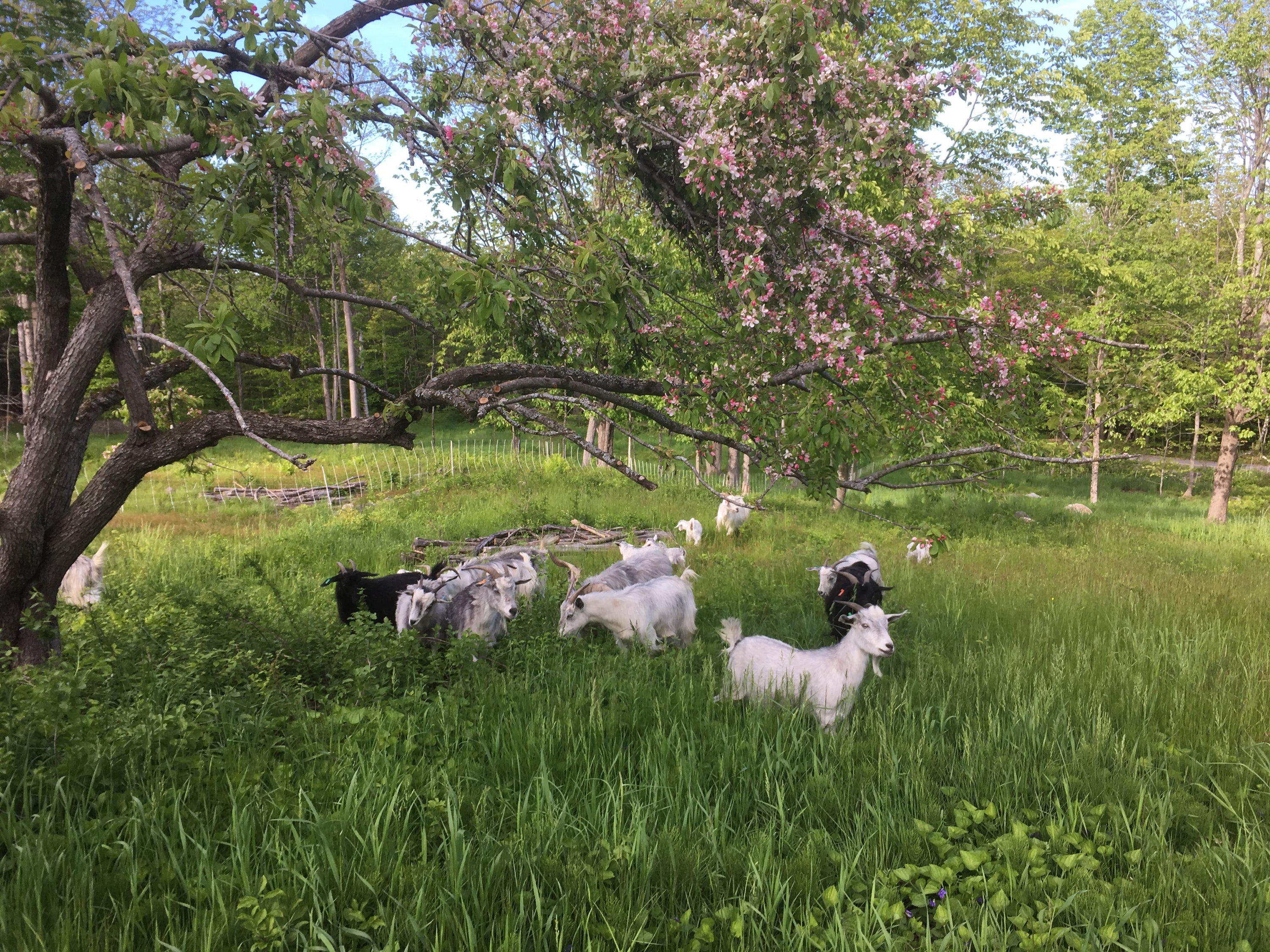
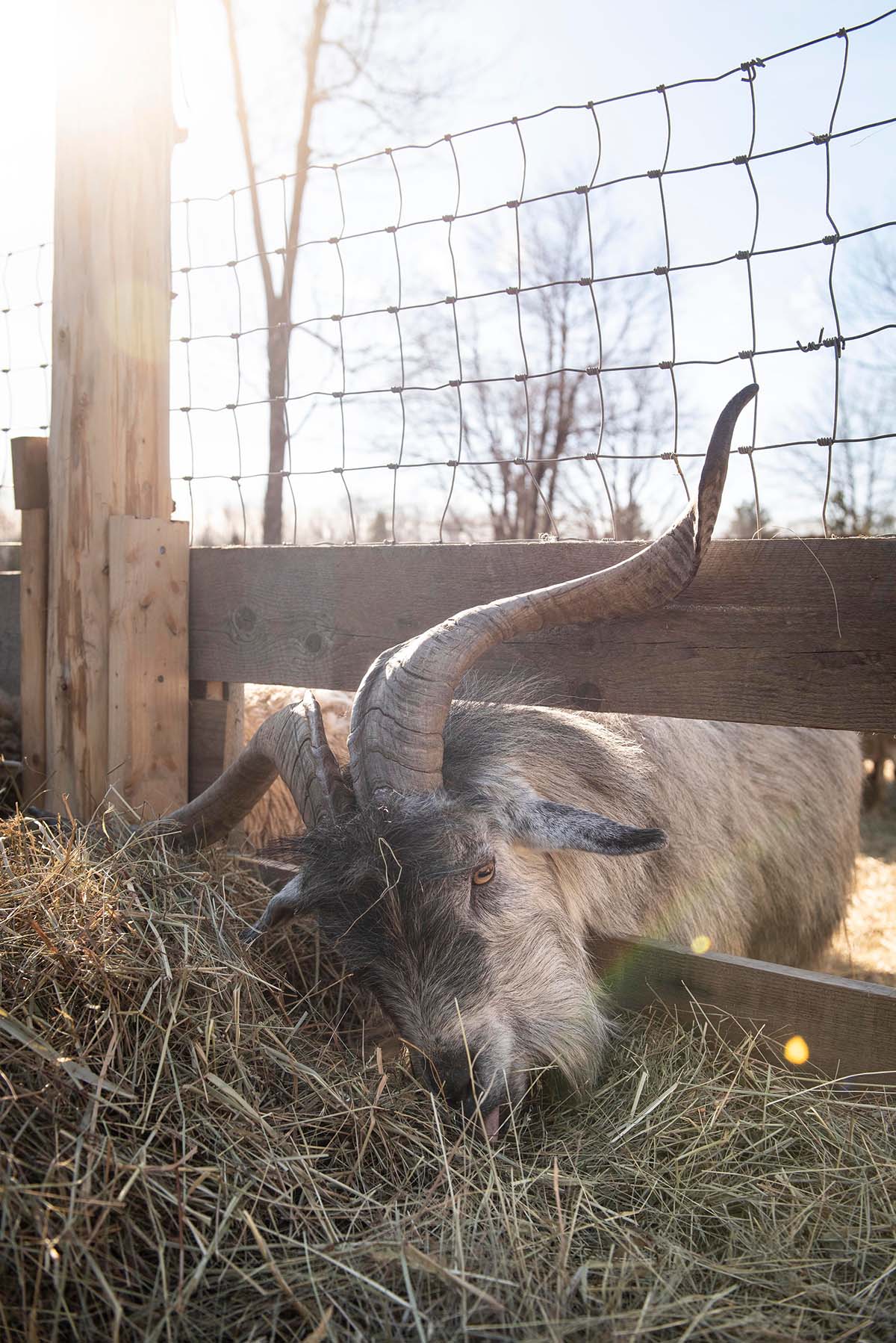
Grass-fed Goat
We raise a herd of North American cashmere goats for fiber, meat, and pelts. North American cashmere goats are more of a “type” of goat, rather than a breed and our goats conform to the breed standard. These goats derive from original stock that was imported from Australia in the early 1980’s and was crossed with both dairy and meat goats to create the goats we raise today. We like these goats for their independent nature and adaptability. Cashmere goats are excellent mothers and generally “easy keepers,” meaning they don’t require a huge amount of doctoring. The breed standard prohibits dehorning, so our goats have horns that indicate their age and seniority in the herd.
Like our cows and sheep, we keep a group of breeding does (females) and a pair of bucks (males) on our farm. The does give birth in the Spring and after weaning at 6 months, their offspring join the previous year’s kids to graze and browse as a group.
In Spring, the cashmere undercoat they grow starts to shed and we comb out the fiber, called cloud, which is sold to a larger cashmere goat producer. They process the cloud to separate the fibers from the course “guard hairs". The average cashmere goat produces 6-8 oz of fiber which makes enough lace weight yarn for a scarf.
Our goats are used to manage the edge areas of the farm, those that are outside of the permanent fences and border the woods, the road, or other unmanaged areas. The goats delight in these areas as they often include stone walls, brambles, and bushy perennials. This work helps us keep uninvited plant guests such as bittersweet, burning bush, roses, honeysuckle, and others in check and out of our pastures. In doing so, the goats derive the benefits of the minerals these deep-rooted plants pull up. This also keeps the goats from eating off the ground where they may ingest parasites.
We finish our goats at 17-20 months on a 100% grass diet. They are harvested in the late Fall when their cashmere has begun to come in. This enables us to harvest them for both meat and their hides which
are then tanned into one-of-a-kind pelts in a variety of colors and textures.
Collapsible content
What’s the difference between goat and lamb in terms of flavor or texture?
None, we notice very little difference between goat and lamb. Both are raised on a 100% grass diet so there is no strong flavor that is often imparted when feeding grain. Lamb is slightly fattier, especially as the meat cools. Goat meat is quite lean and is just as tender as lamb, despite the animals being generally older than our lambs.
How do you use a cashmere goat hide?
The hides can be used in the same way that you might use a sheepskin. Draping them over a chair for added warmth, laying it on the floor as a rug, or putting one on your car seat to keep you warm all winter long are a few examples.
I see that goat is ‘out of stock’ on your website, when will it be available?
Currently, we’re only processing goat in the late Fall and early Winter, so if we’re out of stock you’ll have to wait until then. As our herd grows, we anticipate there being more availability. To be in the know about what’s in season, sign up for our weekly email newsletter.
Can I buy a whole goat?
Nope, currently we sell our goat by the cut. If you’d like some of the value of buying a whole animal without buying a new freezer, then try our CSA.
Can I buy a live animal? Can I harvest it at your farm?
Nope, we are not able to accommodate sales of live animals or on-farm harvest at this time.
I’ve heard goats are great at clearing brush and eating poison ivy, do you ever rent your goats out?
We do not, as our goats have plenty of work at the farm!
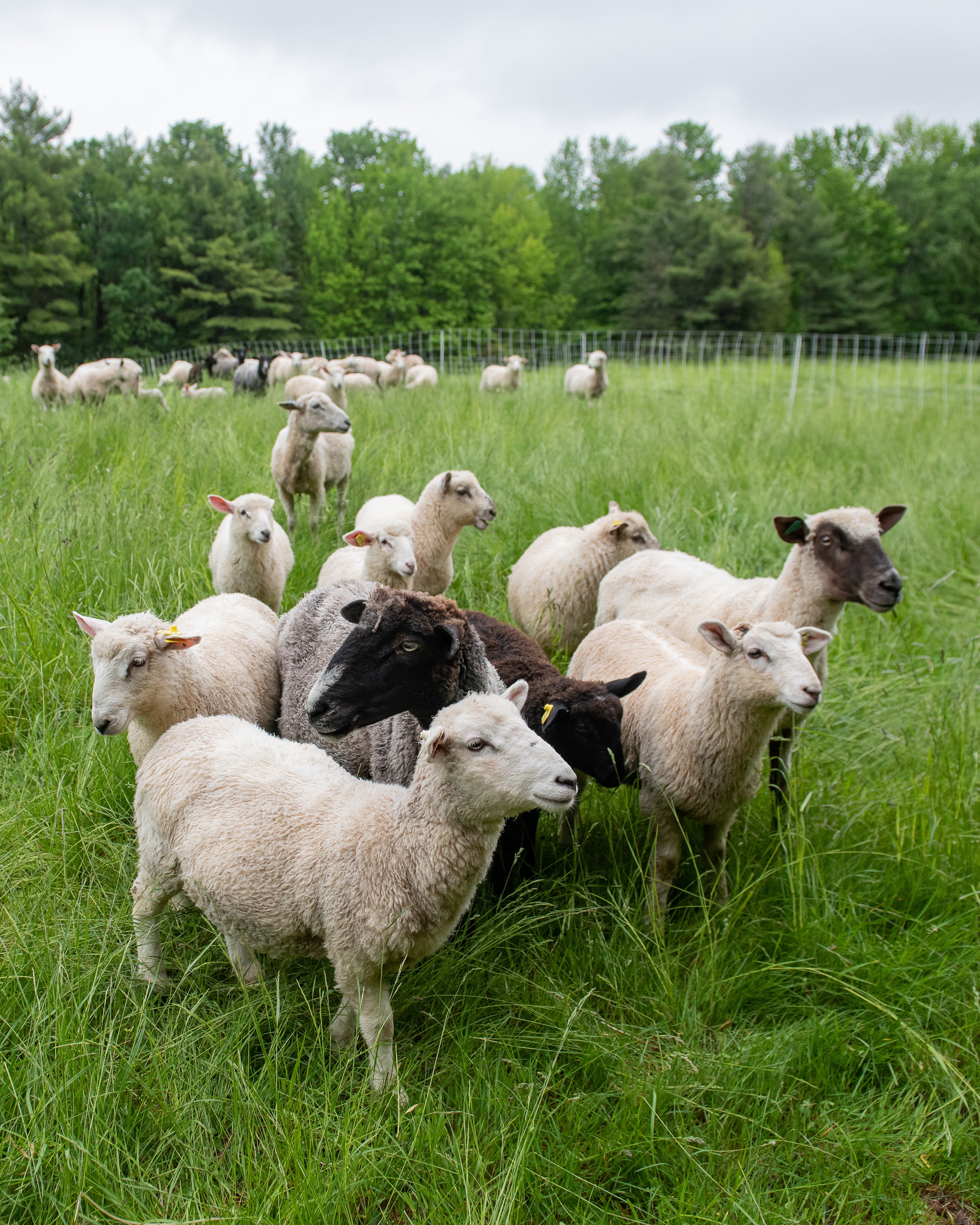
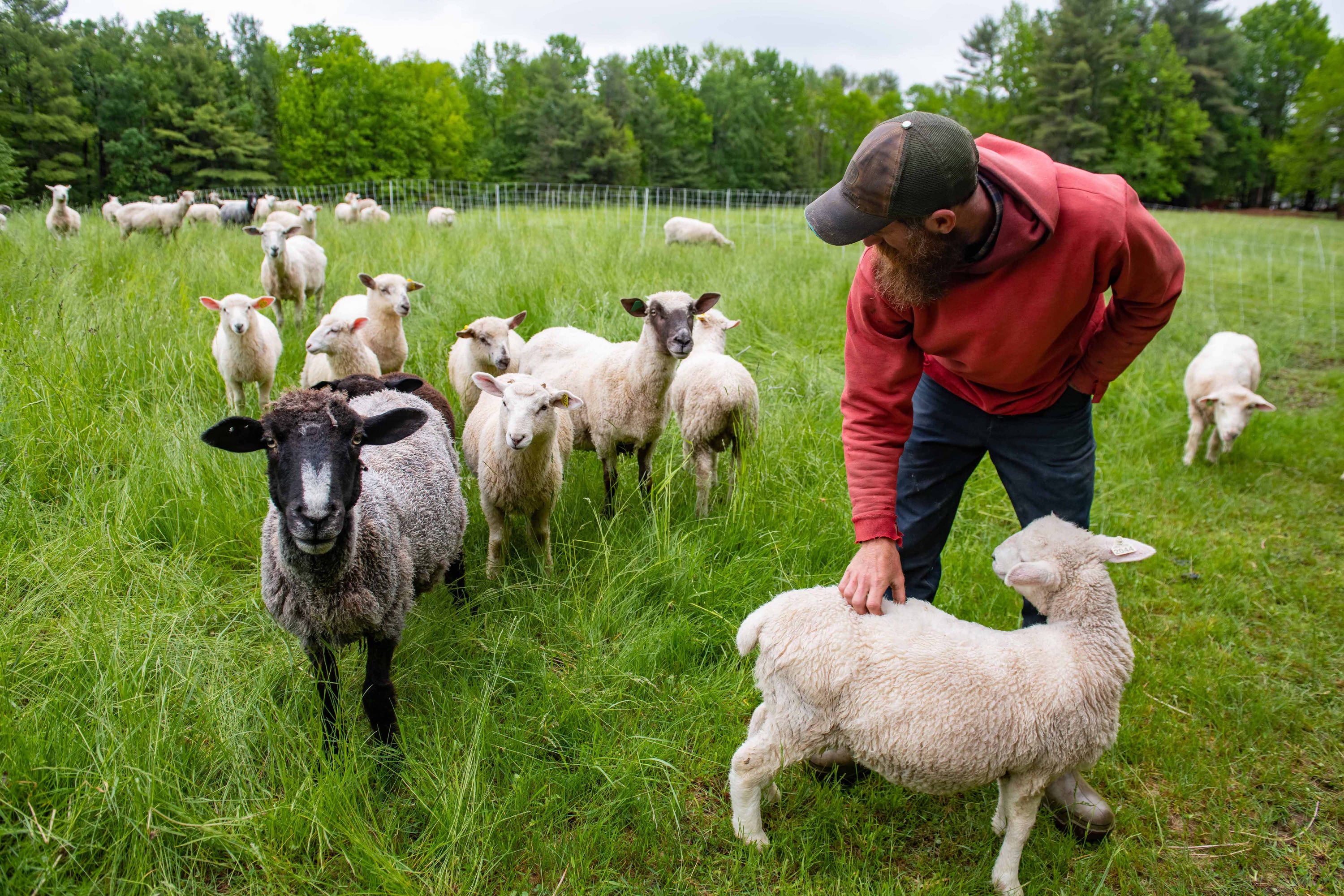
Grass-fed Lamb
Apple Creek Farm started with a homestead sheep flock in the early 1980’s. Jake’s parents, Janet and Pete selected animals for their wool qualities and sold lambs each Spring until 2008. In 2009, Jake transitioned to managing the sheep and began selecting animals to increase frame size, or the size of the sheep overall and milk production to improve lamb growth. Today, our flock includes breeds such as: North Country Cheviot, Blue-Face Leicester, Clun Forest, Oxford, and Suffolk.
Like our cows and goats, we keep a flock of breeding ewes. These gals are often named and certainly have individual personalities and tendencies. Each year we breed our ewes for late Winter lambing which enables us to grow lambs that are ready for pasture when the grass is ready for grazing in the late Spring.
During the growing season our sheep are rotated through our pastures daily. At first, our ewes and lambs go out together so that the lambs can learn about moving as a flock and which plants are good to eat. After weaning, our lambs are managed as a separate flock so that we can ensure they have the best grass on which to grow.
We harvest our lambs between 9-12 months, and, like our goats, we harvest their pelts as well as their meat. This is important to our farm’s financial viability, helps us reduce waste, and honor the animals by using every part. Sheep pelts are salted and dried at the farm before being sent to one of two tanneries to be transformed into unique sheepskins.
Collapsible content
Do you ever sell mutton?
Yes, we make a rosemary mutton sausage that is described as “habit forming”. We will on occasion offer other mutton cuts including ground, stew, or shanks.
Is your lamb 100% grass-fed and grass-finished?
Yes, our lambs never receive grain, though we do supplement them with certified organic alfalfa pellets during their first 2-3 months and if drought conditions necessitate it.
Is all your lamb certified organic?
Nope, we produce both grass-fed and organic lamb. Some of our animals do require treatment with products that are not allowed in organic production. An example might be that a lamb needs to be bottle-fed and at this time, there is no organic milk replacement. So, any animals that are bottle-fed are automatically non-organic. Each animal on our farm has an ear tag or other identifying mark and is tracked from birth to death. This is a requirement of organic livestock management and helps us in practical ways. We can keep records regarding an individual animal’s health in order to better manage it and our flock.
Can I buy a whole lamb?
Nope, currently we sell our lamb by the cut. If you’d like some of the value of buying a whole animal without buying a new freezer, then try our CSA.
Nose-to-Tail
Apple Creek embraces the “nose-to-tail” ethos by using parts of the animals that are often thrown away. This helps reduce food waste and the carbon footprint of our farm.
Bones from our livestock are sold by the pound and are made into frozen broth. “Odd bits” such as hearts, kidneys, and livers are sold by the pound. Organic chicken livers are also made into a delicious pate that is as tasty as it is good for you.
At harvest, the sheepskins and goat hides are brought home and prepared for tanning. Then, the hides are sent to tanneries in Pennsylvania and Vermont to be transformed into unique heirlooms. Our sheepskins and cashmere goat hides are ideal for a bedside rug, thrown over your favorite chair, or as gifts. Learn more about our sheepskins.
